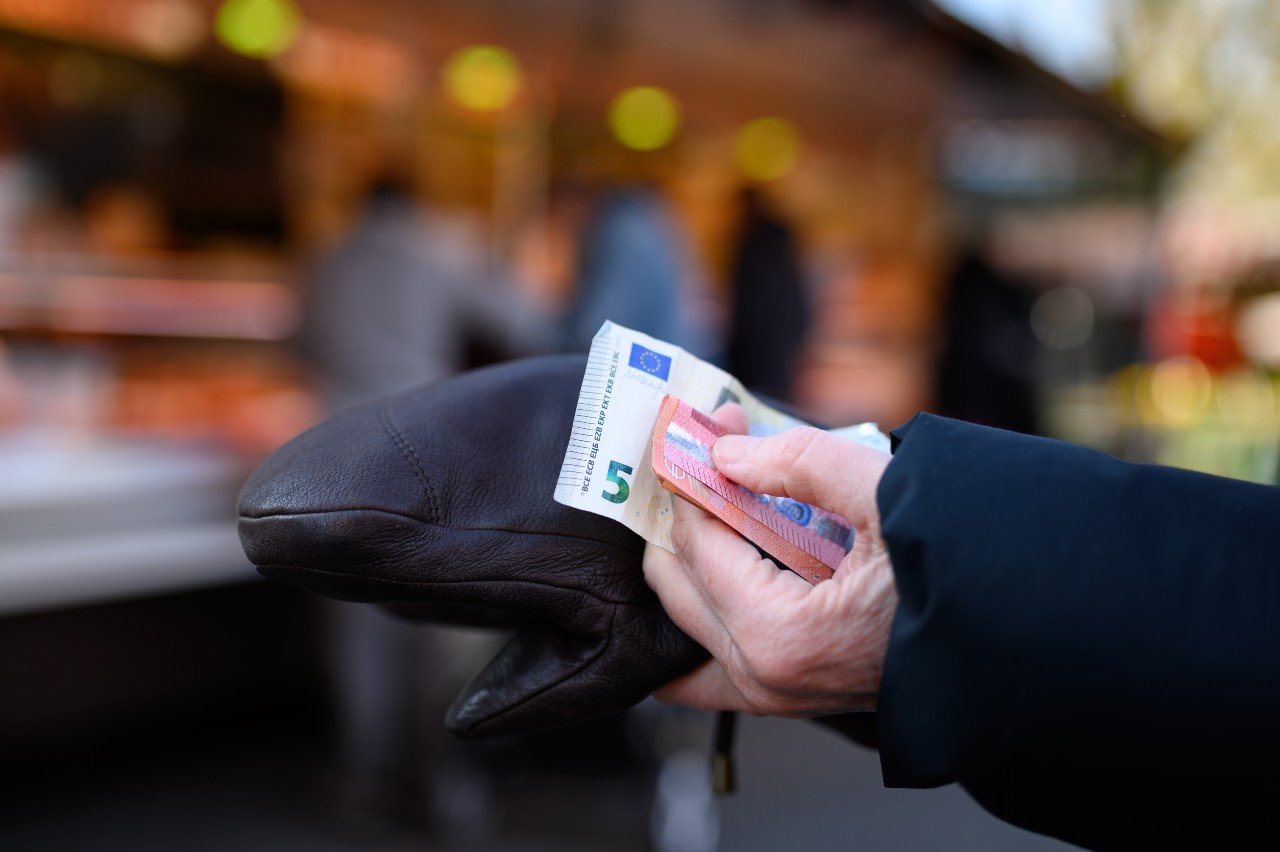Today in Germany: A roundup of the latest news on Friday

German Chancellor Scholz meets with President Biden, Germany sends frigate ship to the Red Sea, inflation is trending down, and more news from around Germany on Friday.
Scholz to meet with Biden on Friday afternoon
Chancellor Olaf Scholz has arrived in Washington for his 24-hour visit, which will focus on further military aid for Ukraine.
Scholz's visit to key ally the United States comes as a $60 billion aid package for Kyiv pushed by Biden has become held up in the Senate amid Republican chaos.
Both Scholz and US President Biden want to prevent aid from Western allies from crumbling two years after the invasion, and are also expected to talk about conflict in the Middle East and an upcoming NATO anniversary summit.
"We must find a way to all do more together," Scholz said in Berlin, adding that what had been promised by Europe and the United States to Kyiv in its fight against Moscow was "still not enough".
EU leaders last week agreed 50 billion euros ($54 billion) of aid for Ukraine, overcoming months of opposition from Hungarian leader Viktor Orban.
READ ALSO: Scholz calls for Ukraine backing as aid wobbles
There will be no press conference with Scholz on Friday, but the two will present themselves to the public together in the Oval Office.
On Thursday evening, Scholz dined at the German ambassador's residence with senators - including some from former President Donald Trump's Republican Party. Here, too, the main topic was aid for Ukraine, which Republicans in Congress have been blocking for months.
Germany sends frigate to help secure Red Sea shipping
A German navy frigate set sail for the Red Sea on Thursday with the aim of protecting commercial ships from attacks by Yemeni rebels, as part of a planned European Union mission.
The deployment marked "the most serious engagement of a unit of the German navy in many decades," navy chief Jan Christian Kaack told reporters in Berlin.
Yemen's Iran-backed Houthi rebels have launched a series of attacks on ships crossing the Red Sea since November, saying their campaign was in solidarity with Palestinians in the war between Israel and Hamas.

Houthi rebels take part in a demonstration against the United States and Israel in Yemen. Photo: picture alliance/dpa | Osamah Yahya
The Red Sea normally carries about 12 percent of global maritime trade.
The unrest has prompted some shipping companies to reroute their vessels away from the Red Sea, making them take the longer and costlier route around the southern tip of Africa.
The "Hesse" frigate set off from the northern German port of Wilhelmshaven with a crew of around 240 people, Kaack said.
Year-to-date inflation at lowest level since June 2021
Price inflation in Germany has slowed significantly at the beginning of the new year.
In January, consumer prices were 2.9 percent higher than in the same month last year, the Federal Statistical Office announced on Friday.
After 3.7 percent in December, the inflation rate thus reached its lowest level since June 2021, when it was 2.4 percent.
Economists expect the inflation rate in Europe’s largest economy to fall further over the course of the year. However, the pace could slow down due to an increase in the CO2 tax and the return to the regular VAT rate on food for the catering industry.
READ ALSO: Five budget cuts set to impact people in Germany in 2024
The rise in the cost of living was comparatively high in Germany last year. At an annual average rate of 5.9 percent, it was lower than in 2022 (6.9 percent), but it was still the second-highest annual figure since reunification.
Kohl mix-up widely reported in German press
US President Joe Biden's latest gaffe about a European leader - this time former Chancellor Helmut Kohl - has been widely picked up by the German press.
Speaking at a campaign event on Wednesday, Biden confused an EU leader with a dead predecessor for the second time in a week, telling a campaign event he met Kohl four years after the German chancellor passed away.
"Helmut Kohl of Germany looked at me and said, 'what would you say Mr President, if you picked up the London Times tomorrow morning and learned that 1,000 people had broken down the doors... of the British Parliament and killed some (people) on the way in (to) deny the prime minister to take office,'" Biden said, according to a report which circulated widely in the German media.
Angela Merkel, Germany's first female chancellor, was the leader attending the summit in question.
Kohl died in 2017 and was chancellor for 16 years from 1982 to 1998, becoming known as the architect of German reunification after the Cold War.
Germans' purchasing power will increase (slightly) in 2024
Germany's largest market research company, GfK, recently released a report on purchasing power across Europe, which suggests that Germans' available spending money will increase to €27,848 per capita this year.
The increase amounts to a nominal 2.8 percent increase, or additional €767 per person on average, compared to 2023, which would offset the latest inflation forecast of 2.9 per cent.

A woman takes several euro notes out of her wallet. Photo: picture alliance/dpa | Jonas Walzberg
Within Germany, purchasing power varies between regions. The district of Starnberg, located near Munich, has the highest spending potential, at €38,702, whereas the district of Gelsenkirchen, in Westphalia has the least, at €22,007.
Generally districts in the south, particularly in Bavaria, enjoy higher purchasing power, whereas districts in the middle to north east of Germany have significantly less.
LISTEN: Strikes, protests and the far-right: The challenges facing Germany in 2024
Additionally Germany’s larger cities tend to rank higher than the surrounding rural regions, with the exception of Berlin, which has less purchasing power per capita than some of the nearby districts in Brandenburg.
Germany ranks well above the European average, which is €17,688.
With reporting from AFP.
Comments
See Also
Scholz to meet with Biden on Friday afternoon
Chancellor Olaf Scholz has arrived in Washington for his 24-hour visit, which will focus on further military aid for Ukraine.
Scholz's visit to key ally the United States comes as a $60 billion aid package for Kyiv pushed by Biden has become held up in the Senate amid Republican chaos.
Both Scholz and US President Biden want to prevent aid from Western allies from crumbling two years after the invasion, and are also expected to talk about conflict in the Middle East and an upcoming NATO anniversary summit.
"We must find a way to all do more together," Scholz said in Berlin, adding that what had been promised by Europe and the United States to Kyiv in its fight against Moscow was "still not enough".
EU leaders last week agreed 50 billion euros ($54 billion) of aid for Ukraine, overcoming months of opposition from Hungarian leader Viktor Orban.
READ ALSO: Scholz calls for Ukraine backing as aid wobbles
There will be no press conference with Scholz on Friday, but the two will present themselves to the public together in the Oval Office.
On Thursday evening, Scholz dined at the German ambassador's residence with senators - including some from former President Donald Trump's Republican Party. Here, too, the main topic was aid for Ukraine, which Republicans in Congress have been blocking for months.
Germany sends frigate to help secure Red Sea shipping
A German navy frigate set sail for the Red Sea on Thursday with the aim of protecting commercial ships from attacks by Yemeni rebels, as part of a planned European Union mission.
The deployment marked "the most serious engagement of a unit of the German navy in many decades," navy chief Jan Christian Kaack told reporters in Berlin.
Yemen's Iran-backed Houthi rebels have launched a series of attacks on ships crossing the Red Sea since November, saying their campaign was in solidarity with Palestinians in the war between Israel and Hamas.

The Red Sea normally carries about 12 percent of global maritime trade.
The unrest has prompted some shipping companies to reroute their vessels away from the Red Sea, making them take the longer and costlier route around the southern tip of Africa.
The "Hesse" frigate set off from the northern German port of Wilhelmshaven with a crew of around 240 people, Kaack said.
Year-to-date inflation at lowest level since June 2021
Price inflation in Germany has slowed significantly at the beginning of the new year.
In January, consumer prices were 2.9 percent higher than in the same month last year, the Federal Statistical Office announced on Friday.
After 3.7 percent in December, the inflation rate thus reached its lowest level since June 2021, when it was 2.4 percent.
Economists expect the inflation rate in Europe’s largest economy to fall further over the course of the year. However, the pace could slow down due to an increase in the CO2 tax and the return to the regular VAT rate on food for the catering industry.
READ ALSO: Five budget cuts set to impact people in Germany in 2024
The rise in the cost of living was comparatively high in Germany last year. At an annual average rate of 5.9 percent, it was lower than in 2022 (6.9 percent), but it was still the second-highest annual figure since reunification.
Kohl mix-up widely reported in German press
US President Joe Biden's latest gaffe about a European leader - this time former Chancellor Helmut Kohl - has been widely picked up by the German press.
Speaking at a campaign event on Wednesday, Biden confused an EU leader with a dead predecessor for the second time in a week, telling a campaign event he met Kohl four years after the German chancellor passed away.
"Helmut Kohl of Germany looked at me and said, 'what would you say Mr President, if you picked up the London Times tomorrow morning and learned that 1,000 people had broken down the doors... of the British Parliament and killed some (people) on the way in (to) deny the prime minister to take office,'" Biden said, according to a report which circulated widely in the German media.
Angela Merkel, Germany's first female chancellor, was the leader attending the summit in question.
Kohl died in 2017 and was chancellor for 16 years from 1982 to 1998, becoming known as the architect of German reunification after the Cold War.
Germans' purchasing power will increase (slightly) in 2024
Germany's largest market research company, GfK, recently released a report on purchasing power across Europe, which suggests that Germans' available spending money will increase to €27,848 per capita this year.
The increase amounts to a nominal 2.8 percent increase, or additional €767 per person on average, compared to 2023, which would offset the latest inflation forecast of 2.9 per cent.

Within Germany, purchasing power varies between regions. The district of Starnberg, located near Munich, has the highest spending potential, at €38,702, whereas the district of Gelsenkirchen, in Westphalia has the least, at €22,007.
Generally districts in the south, particularly in Bavaria, enjoy higher purchasing power, whereas districts in the middle to north east of Germany have significantly less.
LISTEN: Strikes, protests and the far-right: The challenges facing Germany in 2024
Additionally Germany’s larger cities tend to rank higher than the surrounding rural regions, with the exception of Berlin, which has less purchasing power per capita than some of the nearby districts in Brandenburg.
Germany ranks well above the European average, which is €17,688.
With reporting from AFP.
Join the conversation in our comments section below. Share your own views and experience and if you have a question or suggestion for our journalists then email us at [email protected].
Please keep comments civil, constructive and on topic – and make sure to read our terms of use before getting involved.
Please log in here to leave a comment.